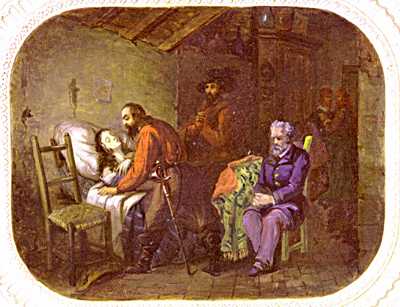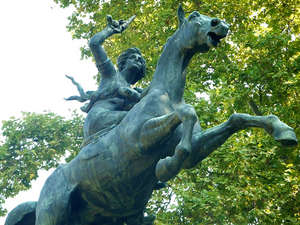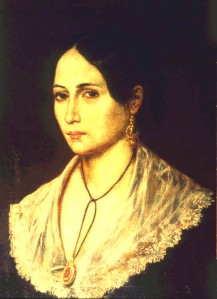Garibaldi’s Worst Hours September 24, 2010
Author: Beach Combing | in : Contemporary, Modern , trackbackGiuseppe  Garibaldi had been, in the late 1830s, an insurgent in Brazil: think Che Guevara with a good barber and bourgeoise decency. He had played the rhetorician who talked up Italian irregulars as they retreated from Rome in 1849: ‘Where we are Rome will be!’ He was the genius general who, in 1860, conquered half the peninsula with deserved luck and twelve hundred men. He was the no-holds-barred naïve idealist who offered himself up for the Union in the American Civil War as long as he was made supreme commander and as long as Lincoln outlawed slavery. And he became – and he was perhaps best in this role – the Old Man of the Mountain, the sage of a newly independent country in the 1860s and 1870s, Italy’s perfect conscience.
Garibaldi had been, in the late 1830s, an insurgent in Brazil: think Che Guevara with a good barber and bourgeoise decency. He had played the rhetorician who talked up Italian irregulars as they retreated from Rome in 1849: ‘Where we are Rome will be!’ He was the genius general who, in 1860, conquered half the peninsula with deserved luck and twelve hundred men. He was the no-holds-barred naïve idealist who offered himself up for the Union in the American Civil War as long as he was made supreme commander and as long as Lincoln outlawed slavery. And he became – and he was perhaps best in this role – the Old Man of the Mountain, the sage of a newly independent country in the 1860s and 1870s, Italy’s perfect conscience.
This was a remarkable life by any standards. But for Beachcombing one scene in that life stands out as a WIBT (‘wish I’d been there’) moment – though for its overwhelming pathos rather than any pleasure that can be derived from it.
In 1849 Garibaldi’s men had given a well-trained and numerically superior French army a bloody nose just outside Rome. But Rome itself was soon overwhelmed as French and Austrian reinforcements (hiss, boo…) poured into central Italy and Garibaldi left the city and took to the hills of Lazio with his army.
Garibaldi travelled with his wife Anita, who was heavily pregnant at the time, and almost four thousand ‘Italians’. Beachcombing need hardly say that their destination was Venice, the only part of the peninsula where Italian patriots had retained control in those fateful months – we are at the fag end of ‘the year of revolutions’. But, hunted on every side, Garibaldi’s men dropped away, melting into the landscape.
By the time that he reached Arezzo (the Arretium of the ancients) he had a mere 2000 troops. By the time he reached San Marino he had only 250. And, all the while, battalions of Austrians were closing in on the Hero of Two Worlds.
Garibaldi continued to ‘escape’ towards Venice – now under Austrian siege – using an improvised fleet, a series of stolen fishing boats. But the Austrian navy met the boats and Garibaldi and his wife were forced ashore in Romagna while most of his comrades were taken prisoner
There followed what must have been the worst hours of Garibaldi’s life. The Austrians and the Papal police were combing the countryside for their great enemy, knowing that he was close and virtually alone, while Anita was suffering a malaria flare up. Malaria is dangerous at the best of times, but for a pregnant woman who had been poorly fed and who could be afforded no decent rest it might very easily prove catastrophic.
Beachcombing gulps.
Constantly hunted, Garibaldi carried his wife from hiding place to hiding place with the help of local supporters. On one occasion the fugitives had to be rushed away as patrols were spotted in the near distance.
Two days after they had landed Anita was finally given medical attention but it was already too late. On 4 August 1849 in the evening she breathed her last in a peasant bed in the Valli di Comacchio with her husband by her side. Of all the tragedies on that awful day not the least was that Garibaldi did not even have the time or privacy to bury his wife and their unborn child properly. A quiet Ave Maria was rung on the local church bell and Garibaldi was constrained to flee in peasant clothes, while Anita’s body was rapidly covered over with sand out in the field.
‘General, you must go now for your children and for Italy…’
Anita’s corpse was found ten days later when a dog began to chew on a hand that protruded from the sand, perhaps thrown up by rigor mortis. A local police report ignobly claimed that Garibaldi had strangled his own wife to prevent discovery on the part of pursuers. The claim has rightly been treated with contempt though Beachcombing has no doubt that sooner or later someone will write a book…
But let us remember better times.
In 1839 Garabaldi had looked down on the city of Laguna in Brazil with his telescope and had spotted a ravishing eighteen year old. He later recorded their first meeting. ‘We both remained ecstatic and silent looking each other over, like two who are not looking for the first time and who are looking for traces in the other of something that will jog a memory.’
Had Garibaldi read the Symposium? In any case, he describes the moment far better than Plato.
‘Finally I said to her ‘You must be mine.’’
Anita, a Brazilian national with a wild gaucho heart, had followed Garibaldi, leaving her first husband behind. And she proved the perfect partner giving Garibaldi four children and fighting by his side through half a dozen battles. There is every indication that they were happy together.
 After her untimely death Garibaldi drifted away from Italy and returned to his first career, a sea captain, working too on land, even in a candle factory in New York. The tragedy clearly weighed on him and would remake him and, in as much as it remade him, it remade Italy. Certainly, Garibaldi’s most important deeds – though he cannot have guessed this – lay in the future.
After her untimely death Garibaldi drifted away from Italy and returned to his first career, a sea captain, working too on land, even in a candle factory in New York. The tragedy clearly weighed on him and would remake him and, in as much as it remade him, it remade Italy. Certainly, Garibaldi’s most important deeds – though he cannot have guessed this – lay in the future.
Anita’s death is, of course, today the stuff of Italian text-book legends and, as all myths, she has been treated atrociously. Her memorial is a bizarre and unworthy equestrian statue on the edge of Rome: part gun-toting Joan of Arc, part risorgimento Valkyrie. Beachcombing keeps coming back in his mind, instead, to the very frightened twenty-nine year old mother-to-be twisting and turning in her last malarial seizures.
Beachcombing has always had a bit of a ‘thing’ about Anita. Any other reflections on this remarkable woman please write to: drbeachcombing AT yahoo DOT com



